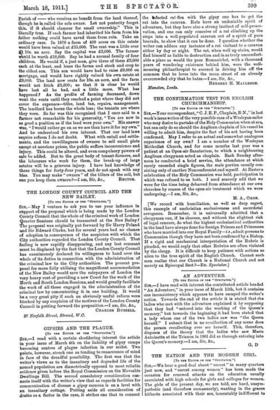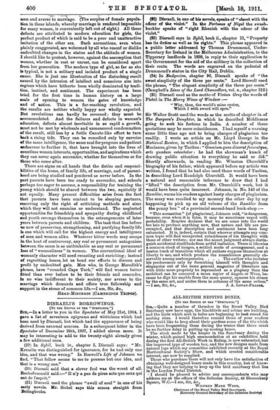THE NATION AND THE MODERN GIRL.
[To THY EDITOR 07 TIER "SPECTATOR."' SIR,—We hear a good deal about " unrest " in many quarters just now, and " unrest among women " has been made the occasion for renewed attacks on the education usually associated with high schools for girls and colleges for women. The girls of the present day, we are told, are hard, unsym- pathetic (and therefore unmannerly), wanting in the graces hitherto associated with their sex, lamentably indifferent to
men and averse to marriage. (The surplus of female popula- tion in these islands, whereby marriage is rendered impossible for many women, is conveniently left out of sight.) All these defects are attributed to modern education for girls, the perfect product of which is said to be a poor and unattractive imitation of the other sex. Such accusations, even when plainly exaggerated, are welcomed by all who resenf or dislike undoubted changes in the status and the attitude of women.
I should like to protest, however, against the assumption that woman, whether in rest or unrest, can be considered apart from her generation. The modern type of girl, so far as she is typical, is not a solitary and isolated product of a single cause. She is just one illustration of the disturbing result caused by the intrusion of intellect and conscious aim into regions which have hitherto been wholly dominated by tradi- tion, instinct, and sentiment. The experiment has been tried for the first time in human history on a large scale of opening to women the gates of knowledge and of action. This is a far-reaching revolution, and the results are neither wholly happy nor wholly expected. But revolutions can hardly be reversed : they must be accommodated. And the failures and defects in woman's education, defects almost inevitable in so rapid a growth, must not be met by wholesale and unmeasured condemnation of the result, still less by a futile Canute-like effort to turn back a rising tide. They can be remedied only by exercise of the same intelligence, the same seal for progress andpatient endeavour to further it, that have brought into the lives of countless women interests, opportunities, and aspirations which they can never again surrender, whether for themselves or for those who come after.
There are signs on all hands that the duties and responsi- bilities of the home, of family life, of marriage, and of parent- hood are being studied and pondered as never before. In the past parents have been too ready to surrender, and schools perhaps too eager to assume, a responsibility for training the young which should be shared between the two, equitably if not equally. Many present difficulties arise from the fact that parents have been content to be sleeping partners, reserving only the right of criticising methods and aims which they will not examine or understand. The neglected opportunities for friendship and sympathy during childhood and youth revenge themselves in the estrangements of later years between parents and children. The task that lies before us now of preserving, strengthening, and purifying family life is one which will call for the highest energy and intelligence of men and women alike. Whatever bitter words may escape in the heat of controversy, any real or permanent antagonism between the sexes is as unthinkable as any real or permanent loss of " womanliness " in woman. The conventional ideal of womanly character will need recasting and enriching ; instead of regretting losses, let us bend our efforts to discern and profit by undoubted gain. Men who, in George Meredith's phrase, have "rounded Cape Turk," will find women better itted than ever before to be their friends and comrades, in no wise indifferent to their society, nor averse to the marriage which demands and offers true fellowship and support in the stress of common life.—I am, Sir, &a.,
HEAD-MISTRESS (CAMBRIDGE TEMPOS).











































 Previous page
Previous page